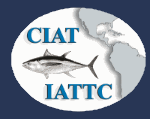- Home
- Research
- Projects
- Improve the bigeye tuna stock assessment: reduce the bimodal pattern in bigeye tuna assessment results
- Objectives
- Improve the bigeye tuna stock assessment by reducing the bimodal pattern in assessment results
- Background
- A benchmark assessment was conducted in 2020 with 48 reference models representing several hierarchical hypotheses for the stock. A risk analysis approach was used to weight those 48 reference models to get probabilistic distribution profiles for key management quantities. The main issue with the assessment results is that the probabilistic distribution profiles for both depletion and fishing mortality are bimodal.
- Relevance for management
- The stock assessment is used to provide management advice for tropical tunas
- The duration of recommended seasonal closures is based on risk analyses of bigeye and yellowfin that use the assessment results
- Improvements in the bigeye assessment will make the staff’s management advice more accurate and precise
- Duration
- 48 months
- Workplan and status
- 2021: Re-evaluate the natural mortality assumptions
- 2022: CAPAM workshops on improving the risk analysis approach
- 2023: CAPAM tuna stock assessment good practices
- 2023: Re-evaluate model assumptions and present an exploratory assessment (SAC-14-05)
- 2024: Benchmark assessment
- Deliverables
- Reports to SAC in 2022, 2023 (SAC-14-05; WSRSK-02) and 2024 (benchmark assessment)

